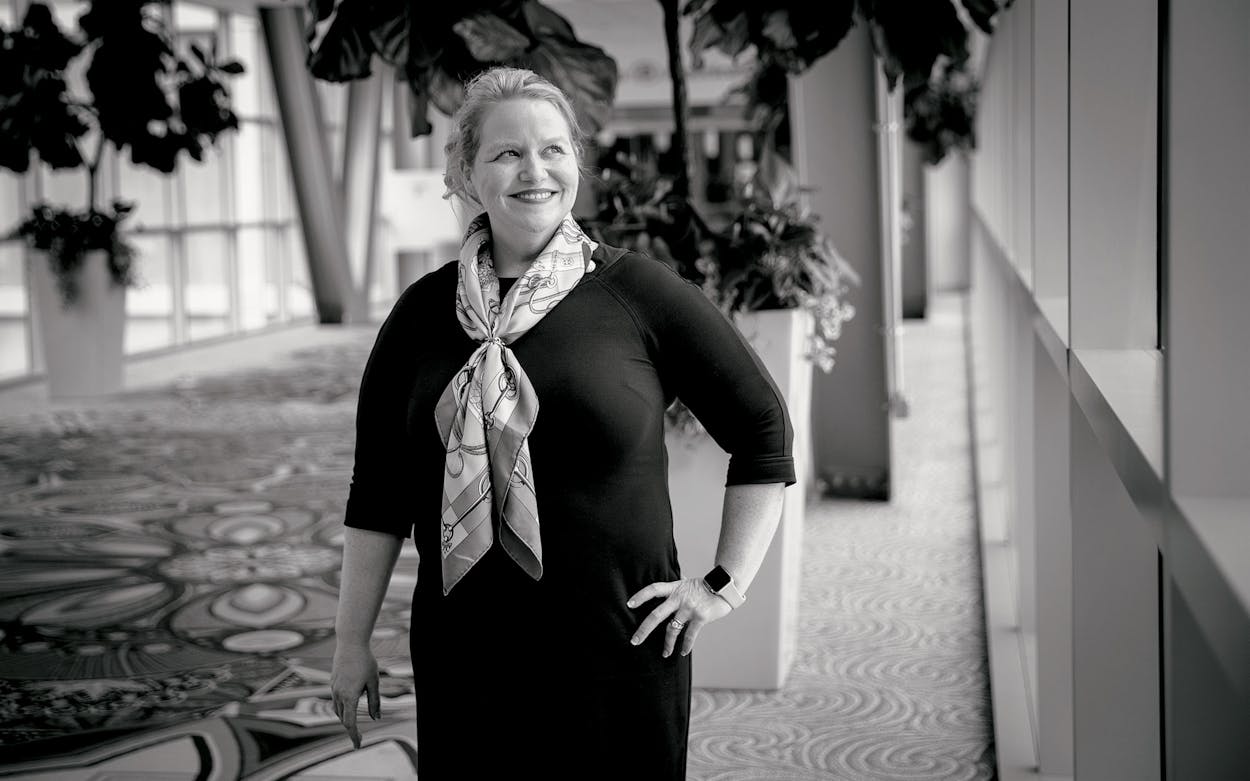A few years ago, I was on a plane between Houston and London, coming home from an executive meeting at BP headquarters. I was on this flight with a guy named Bubba. Bubba swirled his bourbon and says to me, “What is a pretty lady like you doing in a dark, dangerous business like oil?” And I thought: Those are some stereotypes I want to fix. First, “pretty young lady”—which, by the way, I am a pretty lady. But second, why is the energy industry too dark and dangerous for me?
I didn’t say these things to Bubba. I didn’t know what to say, because I’m a Southern girl and I was taught not to speak back to my elders, and he was much older than me. I told him, “Thank you.” I started drinking wine and scribbling a lot of ideas on napkins, laying out a plan for energy to address inclusion and how the industry used social media. I took the notes with me off the plane and when I got home I put them in a bag.
That’s where they stayed until I left BP, and then I pulled them back out. It struck me that they were full of pretty radical ideas. One night, I discussed my ideas with my friend Cindy Patman, who was the diversity director at Halliburton. She said, “This is brilliant. You want to take social media and women and minorities and energy, which is like the most grossly misunderstood subject matter, and make it fun and engaging and put it online?” She was in. And then Shell was in. And since, it’s just taken off.
As luck would have it, I should be thanking Bubba. I started Pink Petro in 2014, when commodity prices began their epic crash and the time was ripe to keep women engaged in our industry. We bring members together, we connect them with great content, and we help the industry tell its story to attract new talent by leveraging the digital age. Some people asked why it’s for-profit. My answer: I started a business because companies don’t just want to see change in the workforce, they want to see change in the supply chain and support women entrepreneurs. And seriously: would a man make this a business, or a charity?
The Pink Petro community teaches people how to tell their own stories. We encourage through coaching and connection. We ask them to get the recognition they deserve. We provide all of that online and in an app that’s accessible on a mobile device.
I get all kinds of questions from companies these days, things like: “We have a diversity problem; our numbers are pretty bad. How do we fix this?” Another one is: “We have diversity programs but they don’t work.” Or: “We have nothing and we need something.” A consultation usually begins with me asking a series of questions: Can I see a copy of your values statement? How do you measure performance? How do you measure people? How do you recognize them? Sometimes there are biases in those measures that form hurdles for under-represented groups.
When I look at the industries that run our world, it’s Wall Street, it’s Silicon Valley, and energy. These are three key fundamental industries that underpin our economy. We need more women to tackle the energy transition and tackle the biggest challenges we face: climate change, energy poverty, and good infrastructure.
But I want to include men in this conversation too. We need the good guys! Men are powerful decision makers and we don’t need to alienate them. A lot of women do wonderful things. Minorities as well. Female minorities are doing amazing things and just not getting the recognition they deserve, nor are great men in our industry who believe inclusion is the path forward.
But this goes beyond gender. This is just all about the balance of power and equality. At the end of the day, ultimately, I think you’re going to find that racism and sexism and all the other “isms” will finally get the attention they deserve. Anything that celebrates difference will be celebrated, elevated, and, with great hope, leveraged.
I’m a conservative—a fiscal conservative—but I participated in the 2017 Women’s March, and people thought that was crazy. Like, “Why are you marching?” And I said, “I’m marching because honestly, this is the kind of stuff I heard about my mom doing in the sixties. I’m using my voice.” I am very pro-women, very pro-minority, pro-different. We’ve proven that difference drives exceptional results when it comes to business, so why wouldn’t I march? We need to depoliticize the women’s movement. It’s about women and men and people who want to see a better, more inclusive outcome.
To see resources about female mentorship, getting involved in local issues, and what to do if you experience sexual harassment, read here.
More from this collection
The Women’s Voices Project
In a series of as-told-to conversations, two dozen Texas women talk about gender, work, and what needs to change for women in their home state. Read their perspectives here.
- More About:
- Energy








